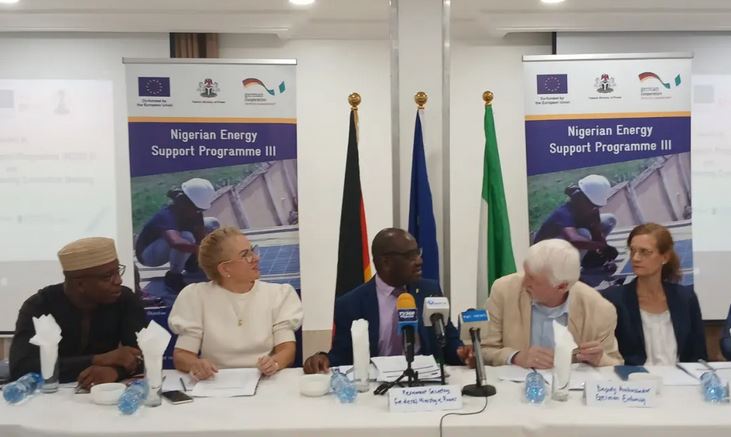
The Federal Government of Nigeria has announced a £17.9 million European Union and German government-funded off-grid electricity project to tackle the blackout in the country.
The Permanent Secretary, Ministry of Power, Mahmuda Mamman, made this known in the 3rd Phase of the Nigerian Energy Support Programme event on Thursday.
The event was organized by the Nigerian Government, EU, and Deutsche Gesellschaft fur International Zusammenarbeit, GIZ, in Abuja.
In his remarks, Mamman said the project will help close the gap of 100 million Nigerians not having access to electricity.
According to him, renewable is significant in addressing the challenges of providing electricity for the unserved rural communities in Nigeria.
“The Phase three of the Nigerian Energy Support Programme is because of the successes recorded in Phases one and two.
“Phases one and two have increased access to electricity supply in rural areas in Nigeria. About 100 million people in Nigeria do not have access to electricity.”
In her remarks, Head of Section Green and Digital Economy at the EU Delegation to Nigeria, Inga Stefanowicz, said at least five million Nigerians will be impacted by the project.
She noted that the initiative will add an additional 400 megawatts to Nigeria’s electricity supply sector.
“We are targeting five million people to gain access to electricity. And some 400 megawatts of renewable electricity are to be generated.
“Solar installation for health projects, we support and work hand in hand with state governments.
“EU financing for this project, we have allocated for the first phase £15 million, then £30 million, and for the third stage it is £9 million,” she stated.
Earlier, Deputy Ambassador, Embassy of the Federal Republic of Germany, Johannes Lehne, emphasized the country’s continued support for Nigeria’s power sector and energy transition plan.
Similarly, Head of Programme, NESP, Duke Benjamin, highlighted that the project, which commenced in 2013, will provide electricity to rural communities not connected to the country’s national grid.
Nigeria’s electricity challenges had persisted despite various interventions.
In 2024 alone, Nigeria’s national grid had collapsed at least eight times.
Nigeria, with an estimated population of over 250 million, generates only 5000 megawatts of electricity.






